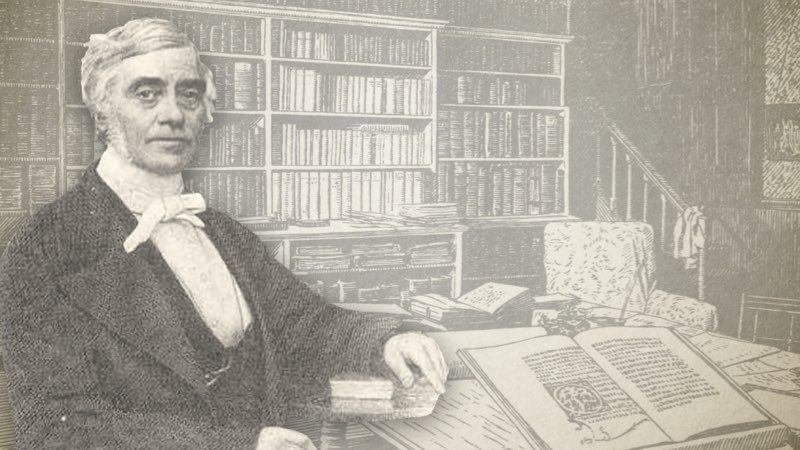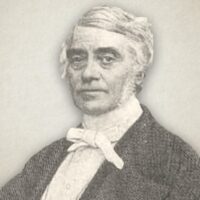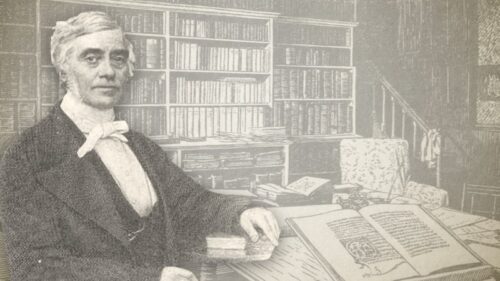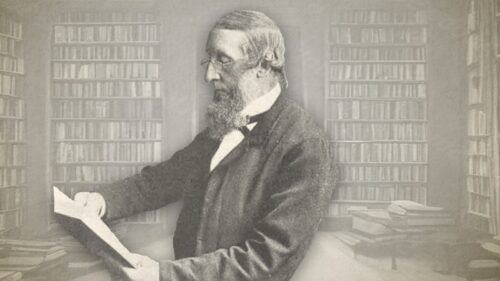
John Gadsby’s Remarks On The Editorship Of The ‘Gospel Standard’ After The Death Of J. C. Philpot
Gospel Standard 187o:
To The Readers Of The “Gospel Standard.”
Dear Friends,—Few of you have experienced more changes during the last thirty years than I have experienced, and fewer still have suffered so much from those changes as I have suffered. I have suffered from dangers and perils oft, by sea and land; I have suffered from deep affliction, and have several times, to all human appearance, been at death’s door, once when hundreds of miles from my family and friends, and I still suffer, never knowing what it is to be free from pain; I have suffered, and still suffer, from intense anxiety on account of the long-continued illness of my dear wife, hardly a day or a night passing in which she is not more or less almost doubled up with agony and vomiting; I have suffered from the loss of a large amount of hard-earned property; I have suffered from the insults and gross, nay, I must say, base misrepresentations and insinuations of some who, though happily unavailingly, endeavoured to separate from me some of my chief friends; yet, for more than a quarter of a century, when I lost my never-to-be-forgotten father, at any rate for more than the fifth of a century, when my dear friend M’Kenzie was taken away, I have never met with anything of a temporal nature which so suddenly weighted me down as did the death of the late invaluable editor of this magazine (J. C. Philpot). Yet, respecting it, I seem to be altogether in a cloud. Though hundreds as well as myself have gazed upon his coffin, and though his body has been laid,—”well laid,” as Mr. Tiptaft would have said, in the grave, I seem unable to comprehend the sad fact. A fact, indeed, though, it is! I shall have no more of his copy to give out to the compositors; no more of his proofs to revise. I never in my life, I think, felt it more hard to say, “Thy will be done!”
It would be immature to attempt to surmise what may be in the womb of providence; but at present our loss appears to be, in many respects, irreparable. I know, and you know, that the Lord can, if he so please, speedily fill up the gap; but none of us can help asking ourselves the question, “Will he?” We are all sure he will if to do so will be for his own glory. But has Augustus Toplady’s, place ever been filled up, or William Huntington’s, or John Warburton’s? Many we have, praise the Lord for it, who preach the same glorious truths as those highly- honoured men preached; but are they preached in the same way, in the same line, with the same power, with the same manifest signs following? I confess that I am not amongst those who think there are some half-dozen, and no more, who preach the gospel, and who would exclude all others from the list of supplies on the wrapper of this magazine, though of many in that list I know nothing, any more than Mr. Philpot did, except that they have been recommended by at least two of our churches. But this I do believe, that the man is not living who can altogether take our deceased friend’s place. Yet surely a work which has been so much blessed as the “Gospel Standard” has been cannot be dependent for its success upon any one man. The work was blessed for years before Mr. Philpot became the editor, and it has been blessed since. (Mr. Philpot did not become the responsible editor until after the death of Mr. M’Kenzie.) It was blessed in the days of my father, whose writings appear in the earlier volumes; it was blessed in the days of M’Kenzie; it has been greatly blessed to the present time. It would, therefore, I believe, be high treason against the God of heaven did I not, as the originator and publisher, continue the work so long as the Lord shall continue that blessing, or so long as my life shall be spared. Its success never was, and, I trust, never will be, dependent upon any one man, either upon me or any one else.
And of this, dear friends, you may rest assured that, with the same blessing, the same glorious truths which have been advocated in its pages, truths which the Lord years ago made dear to me, I may say riveted in my heart, will be still declared therein. I would a thousand times sooner the magazine should at once cease to exist than that those truths should be departed from or be in any way tampered with. There may be a larger number of now-living correspondents, which may, in some measure, make up the breach; but you may, indeed I fear you will, miss your inimitable Annual Address and soul-edifying Meditations.
On Dec. 6th I received a letter from Miss Philpot, apprising me that her father was very unwell, and feared he would not be able to furnish an Address for January. Having an idea that he was so ill as he appears to have been, I replied that, unless an Address of some kind were issued, thousands of his friends would be filled with dire anticipations respecting him. I hoped, therefore, he would be able to write something. This he would receive on the 7th. The next evening I received the following:
“Croydon. Dec. 8, 1869.
“My dear G., I am sorry to say that I am quite ill with a severe, but, I hope and trust, not dangerous attack of chronic bronchitis on my right lung, the left being almost wholly free. Charles says, however, that I am better to-day, and, therefore, I trust, if the complaint take a turn, and a change for the better is once begun, it will pass off like my other attacks, though to my recollection I have never had one so severe.
“In re Address, I cannot hope to furnish one for the January No., at least such a one as I should wish to put forth; but if sufficiently restored by the time needful for the press, I would simply state that owing to my health it must be deferred to the February No. Meanwhile it has struck me that for the first article in its place you might substitute the Experience of——; and in that case I would send it to you for revision, as I have no other to substitute.” (The name is omitted, as the writer does not wish it to appear.)
“We desire much to sympathise with you, and dear Mrs. Gadsby, and all the family in her serious affliction. In case the ulcer should eat a way through the stomach it would cause peritonitis, which would be fatal. May the Lord support her and bless her under her afflictions.
“Yours,
J. C. Philpot.”
On the 9th, while at dinner, the post brought my midday letters. Had there been one in Miss Philpot’s handwriting, I should have opened it immediately; but not seeing one, I quietly put the letters on one side until dinner was over. Judge of my consternation when I opened them to find one from Mr. Philpot’s son, Dr. Charles, announcing to me his father’s death:
”6, Sydenham Road, Croydon, Dec. 9, 1869.
“Dear Mr. Gadsby, Soon after dictating that hopeful letter to you, a change for the worse came on in our dear father, and he died peacefully, in a happy frame of mind, at half-past three o’clock this morning. His chest was much better yesterday morning, and we were all hopeful of his recovery; but towards night he changed for the worse, and at length died from exhaustion…He seemed to be beyond the reach of all medical skill. He thought that his system had been breaking up during the last few months.
“We feel it a great comfort that he died so happily, and that he suffered no pain.
“Poor mamma is overwhelmed; and we, though deeply grieved, have hardly yet fully realised our great loss, this our first break in our family circle, which has been so uniformly happy.
“Yours very sincerely,
“Charles Philpot.”
I read only the first part. Mr. Walsh had been dining with me. We both rose convulsively from the table in a state of the deepest consternation. Had I read the words right? I read again. Alas! Indeed I had! My dear wife, being confined to her room, was happily not present, and I made known to her the sad intelligence in the best way I could. She broke out in excessive hysterical grief, several times exclaiming, “Poor Mrs. Philpot! Poor Mrs. Philpot!” I was obliged to leave the room, for my grief only added to hers. Her nurse was, however, present, and speedily attended to her.
I am not in a position to say who will in future assist in the preparing of the “Gospel Standard”; and, indeed, even if I were, I do not think it would be prudent to do so. My late dear friend Mr. William Brown once said to me, “Keep your machinery out of sight;” and it was an excellent remark; for if an editor be known, he is sure more or less to be personally insulted by ignorant or disappointed men, men who write all sorts of nonsense, and are annoyed that their productions are not inserted; or men who, being in their own view wiser than the editor, are literally enraged when he shows them, from the word of God, that their views are erroneous, their wisdom perfect folly. Even Mr. Philpot did not escape these insults, as he knew to his grief. If a man really wishes to know what bitterness there is in the human heart, even under a profession of religion, he cannot adopt a more effectual mode than becoming the editor of a religious periodical, and being firm and true to his principles. And a publisher often fares no better, persons who are altogether ignorant of him, of his motives, and of facts and circumstances connected with him filling their minds with prejudice against his work, and loading him with abuse.
In conclusion, I am happy to be able to state that for several years past Mr. Philpot and I worked together in harmony, despite the attempts of our common enemy to sow discord. It would not be right to say that we were always perfectly agreed; but when I pointed out to him anything in his writings which would be liable to misconstruction, and what man can write without his writings being liable to misconstruction? he invariably altered it; and when he objected to anything of mine, I invariably omitted it. We sank our differences for the sake of the church in general. Indeed, had it not been for the unwarrantable and malicious interference of others, I do not believe that any serious differences would ever have arisen between us at all.
These few remarks I considered due to you, to my late dear father, to Mr. M’Kenzie, to Mr. Philpot, and to myself.
I am, dear Friends, Yours to serve,
39, Finchley New Road
John Gadsby
John Gadsby and Joseph Philpot’s Partnership In Editing The “Gospel Standard”
Every article, except Mr. P.’s originals, had to be revised, i.e., corrected, by me before it was sent to the compositors. And in correcting some of the pieces, the labour has been immense. I do not, by any means, mean altering the substance, but putting the pieces into common English; yet they were worth the labour, because of the matter. The plan uniformly adopted was this: A monthly parcel of all communications received at Bouverie Street was made up by my manager, R. Figg, and sent to Mr. P. With these I had nothing to do. I never even saw them. Mr. P. examined them, and marked “Insert” upon such as he approved of; and these he sent to me to “revise.” My duty then was to select from them as great a variety as possible, so as to prevent any one person’s writings appearing too often to the exclusion of others. Some communications it was impossible for either Mr. P. or me to even look at, much less examine or revise. For instance, I have before me now, just come from Bouverie Street, a communication consisting of 25 pages, the writing of which is so small that I cannot read it even with the aid of my most powerful spectacles, and which, though I could read it, is so closely written that it could not be corrected, there being throughout about six lines in the length of an inch.
John Gadsby
Joseph Philpot (1802-1869) was a Strict and Particular Baptist preacher. In 1838 he was appointed the Pastor of the Churches at Oakham and Stamford, during which time he became acquainted with the Gospel Standard. In 1849, he was appointed the Editor for the Gospel Standard Magazine, a position he held for twenty-nine years (nine years as joint Editor and twenty years as sole Editor). John Hazelton wrote of him—
“A man of great grace, profound learning, and with a literary style equal to any of his contemporaries. For twenty years he was editor of the "Gospel Standard," in which his New Year's Addresses, Meditations, Reviews, and Answers to Correspondents were outstanding features. His ten volumes of sermons, entitled "The Gospel Pulpit," and his four volumes of "Early Sermons," testify to his powers as an expositor of the Word, to the beauty of his illustrations, and the heart-searching character of his ministry. He was born at Ripple, Kent, where his father was rector, and educated at Merchant Taylor's and St. Paul's schools, entering at Oxford University in 1821, taking a first-class, and ultimately becoming Fellow of his College. He accepted an engagement in Ireland as a private tutor, but prior to his departure he was unexpectedly detained at Oakham. There he bought a book, "Hart's Hymns," and was much struck by the beauty of many of them. In 1827, in Ireland, eternal things were first laid upon his mind, and "I was made to know myself as a poor lost sinner, and a spirit of grace and supplication poured out upon my soul." He returned to Oxford in the autumn, and "the change in my character, life, and conduct was so marked that everyone took notice of it." Early in 1828 he was appointed to the perpetual curacy of Chislehampton, with Stadhampton—or Stadham—not far from Oxford. He soon gained the love and esteem of his parishioners. His Church was thronged, and his labours were unceasing amongst young and old. In 1829 he became acquainted with William Tiptaft (1803-1864), vicar of Sutton Courtney, and a friendship commenced which death alone severed. Both ministers had been led to know the truths of predestination and election and the final perseverance of the saints, and preached them with unflinching boldness. Persecution soon arose; it always does in some quarter when there is a faithful ministry. In 1831 Tiptaft built a chapel at Abingdon, where he remained as a Baptist pastor until his death. In 1835 Mr. Philpot resigned his living and his fellowship; the temporal sacrifice entailed was such that he had to sell almost all his books. Soon after this momentous step had been taken he preached in a chapel at Newbury, which some of his friends had procured for the purpose. He writes: "When I therefore began to open up that God had a chosen and peculiar people the whole place seemed in commotion. One man called aloud, 'This doctrine won't do for me!' and started out, and was instantly followed by five or six others. I was not, however, daunted by this, but went on to state the truth with such measure of boldness and faithfulness as was given me. Some of my friends at the chapel thought that the people would have molested me, but no one offered to injure me by word or action, and I came safe out from among them." He also writes: “——is, I fear, something like the robin spoken of in 'Pilgrim's Progress, who can eat sometimes grains of wheat and sometimes worms and spiders. I am quite sick of modern religion; it is such a mixture, such a medley, such a compromise. I find much, indeed, of this religion in my own heart, for it suits the flesh well; but I would not have it so, and grieve it should be so." He preached much at Allington, near Devizes, and in the Metropolis, and many other places. His ministry was attended by crowds, and was blest to saint and sinner. In 1838 he became Pastor of the Churches at Oakham and Stamford, residing in the latter town till failing health caused his removal to Croydon. At the time of his settlement at Stamford he became associated with the "Gospel Standard," and in 1849 he was appointed editor. He was a most interesting writer on the things of God. His sermons are experimental rather than doctrinal, but when he treated of doctrine it was in a comprehensive and scriptural way, as his "Meditations" amply prove. His book on "The Eternal Sonship" practically closed the controversy which gave it birth. His "Reviews" are most instructive and brilliantly written. Would that the younger members of our Churches made a study of them! "The Advance of Popery" was another work which had a wide circulation, and events today prove the accuracy of the forecasts so solemnly made therein. His "Letters" have been a means of grace to many, and it is refreshing through them to know the spiritual history of some of the excellent of the earth in their day and generation, and to have glimpses of services at Eden Street, Gower Street, and Great Alie Street Chapels, and at Came and other places, especially in Wiltshire.”
Joseph Philpot's Letters
Joseph Philpot's Sermons





